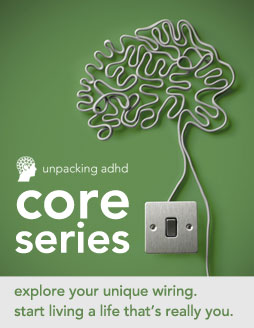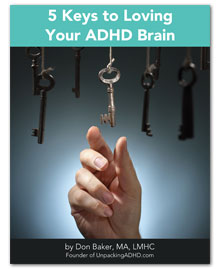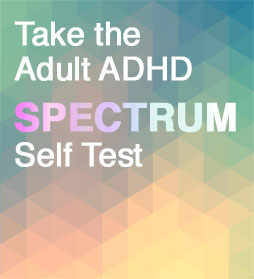When Dr. Robert Glover asked me to write about a common ADD / ADHD trait: resistance to structure, commitment, and accountability, I jumped at the chance. I’ve learned over the years that if I want to do something in a reasonable amount of time, I need to commit to someone (not foolproof), or commit to giving a presentation (usually foolproof: there’s nothing like not being ready in front of people!).
But even these aren’t always enough. I still find myself avoiding, rationalizing – you name it – my way around the thing I need to do.
How about you? Are you consciously aware of resisting structure, commitment, and accountability?
I can easily divide my life into two phases:
Phase One – Before Age 38
You can pretty much characterize my first 38 years as being a guy who just didn’t do commitment. I was variably accountable. If something popped up that sounded more exciting or interesting than what I’d committed to, I was there. And close emotional relationships were difficult at best.
Still, I finished college and graduate school – though I really can’t tell you how – and held down the same job for nearly 20 years. Apparently, those were commitments I could keep. But to be honest, I felt hollow and empty. I really yearned for something more but didn’t know then what it was. I only knew it had to change.
Phase Two – After Age 38
Since age 38 has been very different. I dedicated myself to change and have sustained it. Over time, I began to make different choices based on new insight. This was painful, but I remember thinking and feeling I wasn’t going back to the way it was.
The catalyst was my emptiness, and its memory fueled my new persistence. I can still remember how that felt. I had no idea what I was doing or where I was going, but I absolutely knew I wasn’t going back.
So here I sit, close to 20 years later, having learned a lot about myself – what I’m willing to tolerate, what I want in my life, and what I don’t.
A part of me still disdains certain structures, commitments, and accountability. What’s different, though, is my learning to accept and honor it.
In fact, it’s more than accepting and honoring – but actually embracing it.
I’ve learned to embrace ADD / ADHD as brain diversity. I now understand the neurobiological wiring that underlies ADD / ADHD traits and drives unconscious reactivity to certain environments.
We who have ADD / ADHD have trouble getting comfortable. We have high sensitivity through our sight, hearing, taste, smell, and touch, as well as our intuition.
Extremely empathetic, our sensors are finely calibrated, like those of a dog that hears sounds humans can’t. We sense at levels others can’t attain but, therefore, also suffer wounding others don’t experience.
Once I began to connect my brain and behavior – how I was unconsciously reacting to external stimuli – I began to notice how my sensitivities drove a “moving away” behavior.Unconsciously, my senses were overwhelming me, and I was moving away to get comfortable.
Playing with this concept ever since, I have noticed various sensitivities, most significantly in my close relationships: family, significant other, etc.
My default has always been to shut down. So I work on staying present emotionally, psychologically and, yeah, physically. I’ve learned I don’t have to run to another part of the world to recalibrate.
We all must find out how our own brains are made, our particular “brand,” and where to utilize them positively. We must, above all, refine our thinking tools to accomplish whatever makes sense for us and maximizes our effectiveness.
I’ve learned that when I force my innate strengths into living and learning environments that don’t fit them, I (and maybe you, if you’re close to me) end up hurt.
Start With This
- Identify what you “like” – activities, relationships, experiences, locations, and challenges that activate your brain wiring in positive ways. Actually write them down, make a list.
- Next to each item on the list, write how you can use these positive dynamics to help you reach the goals important to you in a way that fits your “brand.”
- Keep revising your list as you keep learning about you.
Use your brain in ways that give you both happiness and success. Once you do, you will gravitate toward activities and situations that are right for you, that draw on your natural skills, and that show you can reach your potential.
Likewise, you will learn to recognize your hesitation to do things that don’t naturally fit and are not good for you. As you honor this wisdom within yourself, your life path will smooth out.
You will own your journey. You will increase your pleasure. You will know meaningful success.




